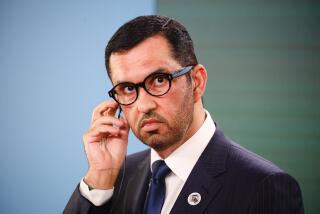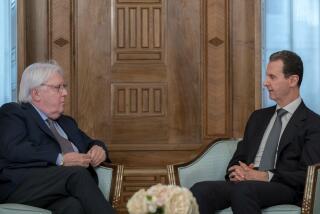Islamic World Is Agape After Summit Turns Ugly
- Share via
DOHA, Qatar — An Iraqi leader unleashed a vitriolic attack on Kuwaiti delegates to an emergency meeting of Muslim nations Wednesday, turning a last-ditch attempt to avert war into a televised verbal mugging that further frayed emotions throughout the Islamic world.
After denouncing Kuwaiti Foreign Minister Sheik Sabah al Ahmed al Jabbar al Sabah for allowing American forces to mass in his country, Iraqi envoy Izzat Ibrahim hurled insults at Sabah’s deputy, who had stood up to defend the minister.
“Shut up, you little man, you traitor, you monkey!” Ibrahim shouted. “Don’t you know you are talking to Iraq?”
By the time Ibrahim, vice chairman of the Revolutionary Command Council, finished off his attack with a suggestion that the deputy, Sheik Mohammed Sabah al Salem al Sabah, Kuwait’s minister of state for foreign affairs, wasn’t man enough to deserve the mustache he wore, all hopes of presenting even a facade of solidarity on the Iraq crisis had disappeared. Television screens in Qatar and elsewhere in the Persian Gulf suddenly went blank as shocked government officials cut off live coverage of the event, but by then it was too late.
The daylong summit of the 57-member Organization of the Islamic Conference never recovered. It concluded with a vaguely worded communique calling for a peaceful settlement of the Iraq crisis within the United Nations framework, but with no plan of action on how to achieve that end. With only a handful of heads of government attending and some countries, such as Saudi Arabia, questioning the wisdom of holding a meeting with little chance of success, a sense of defeat seemed to hang over the event before it even began.
“It’s a very difficult moment,” Qatar’s foreign minister, Sheik Hamad Jassim ibn Jaber al Thani, said at a news conference after the meeting. “The Arab and Islamic world is divided because we don’t know what goals we have.”
The conference failed to produce the show of unity that its hosts had hoped for, and its collapse was spectacular. Live television shots of the exchange left Iraqis as well as Kuwaitis angry, and other viewers in the region stunned.
Wednesday’s verbal pyrotechnics marked the second time in less than a week that Arab leaders have traded bitter insults before television cameras on the Iraq issue. At an Arab League summit meeting last weekend in Egypt, Libyan leader Moammar Kadafi accused Saudi Arabia of “striking an alliance with the devil” by permitting U.S. forces to be based in the kingdom -- an accusation that led Saudi Crown Prince Abdullah to poke his finger angrily at Kadafi and call him a liar.
On both occasions, the target of attack was the leader of a country playing host to U.S. military forces in the Persian Gulf. Public displays of animosity between leaders are highly unusual in the Arab world, where such differences tend to be private.
For some, the recent outbursts reflect a growing tension between countries -- mainly the small Persian Gulf sheikdoms such as Kuwait, Bahrain and Qatar -- that see the United States as a protector and those that view America as a dangerous and menacing intruder.
These tensions have been fueled by the U.S. military buildup in the region and the prospect of an American-led invasion of Iraq. But they are also driven by Washington’s perceived indifference to the increasingly bloody conflict between Israelis and Palestinians -- a conflict almost universally viewed in the Islamic world as an unfair fight.
“If we can’t change the way we do business in the Arab League and at the Islamic conference, then these meetings will become only ceremonial,” said Hamad Jassim, the Qatari foreign minister.
Observers believe that Ibrahim’s outburst, which came at the end of his prepared remarks to the conference, was probably triggered by Sabah’s call -- made moments before in tough language -- that the Iraqi leadership consider making “the ultimate sacrifice” by handing over power and stepping down.
In Baghdad, at the Information Ministry’s international press center, a loud gasp went up when Ibrahim was in effect insulted on live television, something unheard of in such a tightly governed country. There was a stampede of feet as others rushed up in time to catch the end of the exchange.
“That’s good! Tell him!” one man in the crowd shouted when Ibrahim launched his broadside. Sabah’s remarks hit a nerve with a nation that harbors resentment toward Kuwait -- still considered by many in Baghdad as an uppity, pampered and self-important country that by rights should be merely a province of Iraq, which occupied it beginning in August 1990 for seven months, until expelled by a U.S.-led coalition in the Persian Gulf War.
“When someone makes an insult like that, it reflects back on him,” said an office worker, Hassan, who asked that his last name not be used. “The person who said that is like an animal.”
“Very unfortunate for the Arab world in general,” said Ali Daoud, 26, an electrical engineer who watched the exchange on TV. He said Iraq already feels like an outcast.
“Even if Arab countries say they are against the war, they still offer their bases to the United States and most will support the U.S. invasion,” he said.
Within minutes of the emotional clash in Doha, the Qatari capital, word was also spreading through Kuwait like a sandstorm, amplified in prosperous neighborhoods, traditional souks and modern shopping centers. Many Kuwaitis said the Iraqi comments made them angry but didn’t come as a surprise.
Today’s editions of Kuwait’s Arab Times bannered the confrontation with the headline “Kuwait Takes High Ground After Simian Sound Bite.”
“We’ve become so used to this,” said Khalid Doub, a government coordinator with Kuwaiti Oil Tanker Co. “What can you expect from such a lowdown regime.”
Shamlan Essa, a political scientist at Kuwait University, said the outburst was engineered by Baghdad in an apparent bid to shift the focus away from calls for Iraqi President Saddam Hussein to step down voluntarily and spare the region war.
At Wednesday’s meeting, delegates decided to sidestep a controversial exile-with-amnesty proposal for Hussein. The idea was put forward by the United Arab Emirates at last weekend’s Arab summit and won backing a few days later from a group of six gulf states, including Kuwait, Saudi Arabia and Wednesday’s host, Qatar. An Iranian idea for a reconciliation between Hussein and his domestic opponents followed by free elections also seemed to go nowhere.
The conference also contained occasional surreal elements. Although delegates agreed in the final communique that Islamic states should “abstain from participating in any military action targeting the security and territorial integrity of Iraq,” the meeting unfolded only 20 miles from the U.S. Central Command’s forward headquarters at Camp As Sayliyah, where a force of about 3,000 would constitute the operational nerve center of any invasion of Iraq. U.S. Air Force C-130 and C-17 transport aircraft flew over.
Many Kuwaitis acknowledged that the depth of their government’s support for the U.S. and Britain has made even some moderate Arab states a bit nervous -- which puts Kuwait in a tricky position. Although most of Kuwait’s Arab neighbors have little regard for the Iraqi leadership, they are wary of heavy-handed Western intervention.
Ibrahim’s outburst Wednesday could yield one benefit for Kuwait, Essa said. By bringing the issue out into the open, it may bring more pressure on Arab states to clearly decide whether they want to side with the United States or Iraq.
“Now, hopefully, the picture becomes more clear,” he said.
*
Marshall reported from Doha, Daniszewski from Baghdad and Magnier from Kuwait City.
More to Read
Sign up for Essential California
The most important California stories and recommendations in your inbox every morning.
You may occasionally receive promotional content from the Los Angeles Times.










